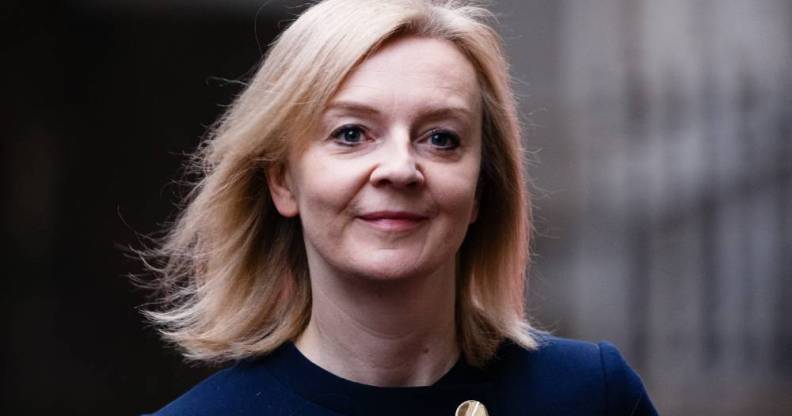Government accused of ‘burying’ urgent research on conversion therapy in the UK

Liz Truss. (NurPhoto via Getty/ David Cliff)
The Conservative government has been accused of “burying” key conversion therapy research which hit ministers’ desks over eight months ago.
The report – led by by Coventry University – followed a call for people to share first-hand experiences of conversion therapy “in a medical, commercial or faith-based context”.
It was commissioned over two years ago by the Government Equalities Office when Theresa May was in Downing Street. Liz Truss, as minister for women and equalities, is currently resposible for the GEO.
A BBC Freedom of Information request revealed that a final draft was received on 15 December, 2020. However, the findings still remain unpublished.
Matt Hyndman, co-founder of the Ban Conversion Therapy campaign group, told the BBC that the report should have been published back in January.
“It sounds like it’s just been buried in a drawer somewhere and it’s not that urgent,” he said. “If they’ve commissioned a study which says conversion therapy is happening and it’s quite severe and they’ve been delaying to ban it, it’s not a good look.”
He questioned why more information was needed to move ahead with a ban, saying: “We have so many stories of people and organisations that can attest to the harm it causes.”
Campaigners have heavily criticised the Conservatives for “dragging their feet” on the matter of conversion therapy, which remains legal in the UK three years after the government first pledged to ban the practice in the 2018 LGBT Action Plan.
After continual delays prompted a string of resignations from the government’s LGBT+ advisory panel in March, equalities minister Liz Truss promised to bring forward a ban “shortly”.
Two months later the government said the legislation would only be advanced after a public consultation process which will “ensure that the ban can address the practice while protecting the medical profession; defending freedom of speech; and upholding religious freedom”.
This has led to fears that an eventual ban could include exemptions for faith groups, which are often the perpetrators of conversion therapy.
A government spokesperson said, per the BBC: “Our approach is based on a range of evidence, which we will publish alongside the consultation, including the Coventry University report.”
While the report is now complete, the consultation is still forthcoming with no timeline announced.
Faith communities are calling for conversion therapy to be banned
Stonewall CEO Nancy Kelley described plans for a public consultation as “concerning”, saying such a process “will be hard for our communities to hear”.
“We don’t need a consultation to know that all practices that seek to convert, suppress, cure or change us are dangerous, abusive and must be banned,” she said in May.
“Lesbian, gay, bi, trans, intersex and ace communities have been waiting almost three years for the UK government to follow through on their promise to ban all conversion practices, and any delay leaves us at further risk of abuse.”
Although some groups such as the Evangelical Alliance have welcomed the consultation, multiple faith communities have called for a conversion therapy ban to be brought forward immediately.
In June the Hindu Council UK urged the government to “ban the so-called ‘conversion therapy’ as a degrading and harmful practice without delay,” a call echoed by Buddhist charity the Dhamma Center which said conversion therapy “has no place in the modern world”.
Meanwhile the bishop of Manchester explicitly backed the prosecution of religious leaders who provide the dangerous and debunked practice, saying that a public consultation “has all too often been a phrase used to excuse foot-dragging”.
In 2018 the government held a public consultation on reforms to the Gender Recognition Act (GRA), which would have simplified the process of legal gender recognition for trans people.
The results of that consultation weren’t announced until September 2020, which showed broad support for reform. Days later, the government announced that it was scrapping plans to reform the GRA.

